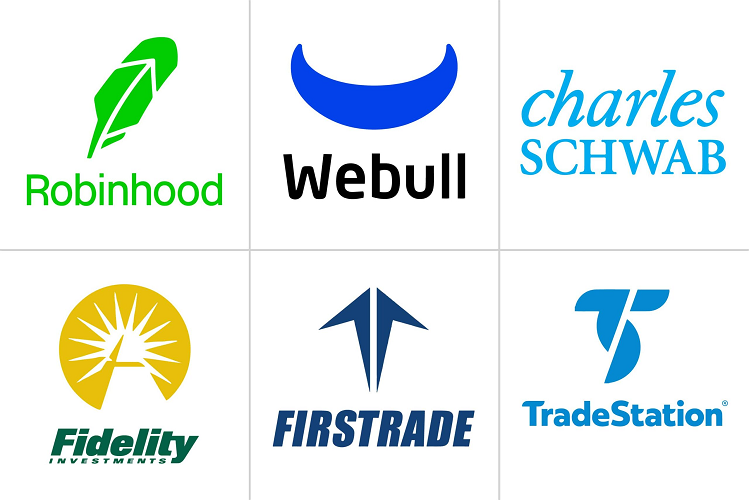Best Online Trading Platforms 2025 Speed, strategy, and smart choices—these are the traits shaping online trading in 2025. With markets moving faster than ever and platforms fighting for dominance, traders need more than just flashy dashboards. They crave low fees, cutting-edge tools, real-time insights, and lightning-fast execution. Choosing the right trading platform today could be the edge that defines tomorrow’s financial success.
Whether you’re flipping crypto at midnight or building a long-term stock portfolio, the right platform can amplify every trade. From zero-commission deals to AI-powered analytics, the smartest investors are now using platforms that do more than just buy and sell—they empower.
Why Choosing the Right Online Trading Platform Matters
Your online trading platforms is more than just a tool — it’s the gateway to your entire investing experience. The features, fees, and services it offers can either enhance your trading success or hinder it. A powerful platform helps you trade confidently, while the wrong one may cost you in missed opportunities or unnecessary charges. Today’s platforms vary significantly in terms of what they offer, ranging from technical analysis tools to a wide variety of available assets.
Before signing up, smart investors consider how a platform matches their financial goals, trading habits, and security expectations. Choosing wisely helps save money, improve decision-making, and create a smoother trading routine across all devices.
Cost Efficiency
Trading platforms come with different pricing models — some charge zero commissions while others take a fee on every trade. Understanding these fees is essential because they can quickly reduce your profits, especially if you trade frequently. A platform with hidden or high costs can quietly drain your portfolio over time.
Look for platforms that offer clear pricing, no hidden charges, and cost-effective features, such as free research tools or bulk order discounts. You want to maximize your returns, not spend them on platform fees.
Ease of Use
An intuitive design makes all the difference when managing your investments. A cluttered or confusing dashboard can lead to mistakes, delays, or frustration, especially for beginners or mobile users. You need quick access to charts, order placements, and your portfolio in real time.
Modern platforms offer drag-and-drop features, smart menus, and responsive apps. Choosing one with an easy learning curve allows you to focus on strategy, rather than figuring out where to click.
Research & Tools
Having access to expert analysis, real-time data, and market forecasts can significantly enhance your trading decisions. A strong platform provides reliable insights and lets you customize your analysis through technical indicators, screeners, and alerts.
Advanced traders benefit from tools such as backtesting and margin calculators, while beginners appreciate educational centers and tutorials. The right research support can turn a guess into a confident, data-driven move.
Asset Variety
Different traders look for different assets, and not all platforms offer the same selection. Some are great for stocks only, while others include ETFs, cryptocurrencies, forex, and even commodities. The more options you have, the easier it is to diversify your portfolio.
Whether you’re experimenting with fractional shares or exploring international markets, ensure your platform gives you access to the investments you care about most. Flexibility leads to stronger strategies.
Customer Support
When things go wrong — a trade stalls, an account gets locked, or funds disappear — fast and reliable support matters. Some platforms offer 24/7 live chat, phone access, and email support, while others rely on slow response times or automated bots.
Check reviews to see how responsive the platform is. Quality customer service isn’t just a perk; it’s a safety net when you need real-time help with your money.
How Can You Evaluate Online Trading Platforms

When selecting an online trading platform, it’s essential to look beyond surface features and delve into what truly matters. A great platform should align with your trading habits, financial goals, and skill level. Evaluating platforms across key performance areas ensures that you’re not just choosing the most advertised brand but one that delivers real value.
The best way to judge a platform is by checking its pricing model, asset availability, trading experience, customer care, and safety protocols. Promotions are the cherry on top, but your long-term trading success depends on what’s under the hood.
Trading Fees & Commissions
Different platforms use different pricing models. Some offer commission-free trading on stocks and ETFs, while others charge small fees for every order, especially with options and futures. These fees may seem minor, but they can accumulate over time if you trade regularly.
Also, pay attention to less obvious charges, such as platform usage fees, margin interest, or inactivity penalties. Choose a platform that provides cost transparency and allows you to trade affordably without compromising your returns.
Account Minimums
Some brokers allow you to start trading with just a few dollars, while others require a higher initial deposit. Understanding the minimum funding amount helps you plan your market entry without delay.
For beginners or those on a tight budget, platforms with $0 minimums are ideal. They provide you with the freedom to grow gradually, offering flexibility and a low-pressure entry into investing.
Available Investment Options
Not all platforms provide access to the same range of investments. While many support stocks and ETFs, others also include options, mutual funds, cryptocurrencies, commodities, and even international equities.
If you plan to build a diversified portfolio, choose a broker that offers a wide variety of tradable assets. More choices mean more opportunities to balance risk and capitalize on various market trends.
Trading Tools and Features
From real-time data and customizable charts to advanced indicators and strategy backtesting, modern trading tools can give you an edge. An ideal platform combines speed, depth, and flexibility in its web and mobile apps.
Look for features that match your trading style — whether that’s technical analysis, automated alerts, or integrated news feeds. The better the tools, the more precise and informed your trades will be.
Customer Service Quality
When you encounter an issue — such as a failed trade or login trouble — helpful support makes all the difference. Great brokers offer quick access to real humans via chat, phone, or email, and have informative FAQs to assist at any time.
Don’t overlook customer care when evaluating a platform. A well-rated support team is your safety net, especially during high-stakes trades or market volatility.
Security Measures
Your financial safety should never be compromised. Top trading platforms protect your account using high-level encryption, biometric logins, and two-factor authentication. They’re also regulated by trusted financial authorities like FINRA, SIPC, or SEC.
Before trusting any platform with your funds, check its compliance records, insurance coverage, and past security history. Safety is just as vital as performance in the digital investing world.
Promotions and Bonuses
To attract new users, many brokers offer welcome deals, like free stocks, cash rewards, or fee rebates. These perks can be a nice boost to your account balance right from the start.
While bonuses shouldn’t be the sole reason you choose a platform, they can help you get more value as a new user. Be sure to read the terms carefully — some require a minimum deposit or a specific number of trades to qualify.
Top Online Trading Platforms for 2025

At this stage, I will discuss some unique online trading platforms that can assist you in your further selection. Have a look below for details.
Webull
Overview: Webull has surged in popularity among both novice and active traders, offering a sleek mobile-first platform with commission-free trades.
Pros:
- $0 commissions on stocks, ETFs, and options.
- Advanced charting tools and technical indicators.
- Fractional shares and crypto trading.
- High interest on uninvested cash balances.
Cons:
- No access to mutual funds.
- Crypto trading requires a separate app.
- Customer service can be limited.
Why It’s a Top Pick: Webull appeals to tech-savvy investors who want advanced tools without the fees, making it an ideal choice for both beginners and active traders.
Charles Schwab
Overview: Charles Schwab is a well-established brokerage firm recognized for its comprehensive platform and exceptional customer service.
Pros:
- $0 commission for stocks, ETFs, and options.
- Wide selection of no-transaction-fee mutual funds.
- Multiple trading platforms, including StreetSmart Edge.
- Strong educational resources.
Cons:
- Interest rates on idle cash are relatively low.
- It can be overwhelming for absolute beginners.
Why It’s a Top Pick: Schwab balances ease of use with powerful features, perfect for investors looking for reliability and research depth.
Fidelity Investments
Overview: Fidelity remains a leader in customer service and research, offering commission-free trading and a robust mobile app.
Pros:
- Zero commissions on stocks and ETFs.
- Large selection of expense-ratio-free index funds.
- Award-winning research and market analysis.
- Strong retirement planning tools.
Cons:
- Broker-assisted trades come with higher fees.
- The interface may be complex for new investors.
Why It’s a Top Pick: Fidelity is ideal for investors who want access to top-tier research and diversified investment options.
Robinhood
Overview: Robinhood revolutionized commission-free trading and fractional share investing, popularizing the concept among millennials.
Pros:
- No commissions on trades.
- User-friendly mobile app.
- Cryptocurrency trading included.
- Fractional shares for easy diversification.
Cons:
- Limited research and educational materials.
- Past outages have caused trading interruptions.
Why It’s a Top Pick: Robinhood is ideal for beginner investors seeking simple, mobile-first trading with no fees.
Interactive Brokers (IBKR Lite)
Overview: Known for its global reach and professional-grade tools, Interactive Brokers offers a commission-free tier for retail investors.
Pros:
- Commission-free stock and ETF trades.
- Access to international markets.
- Powerful trading platform with deep tools.
- Extensive mutual fund options.
Cons:
- The platform can be complex for beginners.
- A high balance is required to earn interest on idle cash.
Why It’s a Top Pick: Perfect for serious traders needing global access and sophisticated tools.
SoFi Invest
Overview: SoFi Invest targets new investors with a clean interface and easy access to fractional shares and IPOs.
Pros:
- $0 commissions and no account minimum.
- Access to IPO shares.
- Automated investing and robo-advisor services.
- Member benefits include financial planning.
Cons:
- Limited advanced trading tools.
- Research offerings are basic.
Why It’s a Top Pick: Great for beginners looking to get started quickly with guided options.
Public.com
Overview: Public.com combines social investing with commission-free trades, appealing to investors who want community insights.
Pros:
- Commission-free trades on stocks and ETFs.
- Social feed for market news and investor stories.
- Options for bonds and crypto.
- High-yield cash accounts.
Cons:
- No mutual funds.
- Fewer advanced tools for technical analysis.
Why It’s a Top Pick: Ideal for investors wanting to learn through social interaction and share ideas.
Key Benefits of Trading Online in 2025
Online trading in 2025 offers far more than just convenience. It’s now a fast, efficient, and flexible way to access global markets right from your smartphone or desktop. With platforms improving their services through cutting-edge technology, new and seasoned traders can now manage investments in real-time with ease. From cost savings to powerful tools, online platforms are leveling the financial playing field.
Whether you’re looking to buy stocks, trade crypto, or analyze market trends, these benefits highlight why digital trading is now the go-to choice for modern investors.
Accessibility
Modern apps let users check their portfolios, execute trades, or monitor real-time market data from anywhere in the world. Whether you’re commuting or relaxing at home, trading is now just a few taps away.
The rise of mobile-friendly dashboards and instant notifications gives investors control over their assets around the clock, regardless of location or device.
Lower Costs
In 2025, many platforms will continue offering zero-commission trades on stocks and ETFs. This helps traders keep more of their profits and reduces the barrier to entry.
While some specialized services may still carry small charges, the average investor benefits from transparent pricing and affordable investing opportunities.
Diverse Investments
Traders today can invest in more than just company shares. From cryptocurrencies and index funds to commodities and international assets, the range is massive.
This broad selection allows you to build a diversified portfolio without needing multiple accounts across different providers.
Advanced Tools
AI and machine learning now power many trading platforms, offering predictive alerts, automated tracking, and intelligent investment suggestions.
These tools help simplify decision-making, providing users with access to smarter analytics that were previously available only to professionals.
Educational Support
Whether you’re new to the field or experienced, top platforms offer guides, tutorials, and demo accounts to help you sharpen your skills.
Video walkthroughs, webinars, and strategy tips make learning easier and boost user confidence in navigating complex market scenarios.
Common Mistakes to Avoid When Choosing a Trading Platform
Choosing the wrong platform can waste both your time and money. Many traders jump in based on flashy ads or short-term offers, only to regret it later. To make the most of your online trading experience, avoid these common pitfalls that can quietly drain your profits or limit your growth. Smart selection begins with awareness of these overlooked issues. Here’s what to stay cautious about when opening a new trading account:
Ignoring Fees
A platform may advertise free trades but conceal other charges, such as margin interest or inactivity fees. These small amounts add up and reduce your long-term gains.
Always review the fee schedule thoroughly — check for hidden charges related to account transfers, options contracts, or premium tools.
Choosing Based on Promotions Alone
Sign-up perks, such as free stocks or cash rewards, are attractive, but they shouldn’t be your only reason for choosing a broker.
After the initial promotion expires, look at how the platform performs in the long run — in terms of service, tools, and overall reliability.
Overlooking Security
If a broker lacks proper regulation, secure login, or account insurance, your funds are at risk. Strong security should be non-negotiable.
Look for multi-layered safety features, such as encryption, fraud alerts, and SIPC protection, before entrusting your capital.
Neglecting Platform Usability
A clunky interface can make it frustrating to track markets or execute trades, especially during fast-moving situations.
Always test a platform’s design and ease of use before committing—clean layouts, responsive controls, and clear labeling matter more than you think.
One Size Doesn’t Fit All
A beginner might prefer a simple dashboard, while an active day trader needs fast execution and real-time analytics.
Understand your trading habits and goals, then choose a platform that supports your needs, rather than forcing you to adapt to theirs.
Conclusion
Choosing the best online trading platforms in 2025 requires understanding your investment goals, trading style, and the features that matter most to you. Whether you prioritize cost-efficiency, advanced tools, research, or ease of use, there’s a platform tailored to your needs.
The platforms highlighted here — Webull, Charles Schwab, Fidelity, Robinhood, Interactive Brokers, SoFi Invest, and Public.com — represent some of the best options available. Take the time to compare their offerings and start your investment journey with confidence.
Smart investors know that the right platform can make all the difference — choose wisely and trade smart in 2025!
FAQs about the best online trading platform
What features should I look for in the best online trading platform in 2025?
Look for platforms that combine low fees, powerful trading tools, and a clean, easy-to-use interface. Ensure they offer access to a variety of assets, including stocks, ETFs, cryptocurrencies, and options. Fast trade execution, real-time data, and AI-powered insights are also a plus in 2025. Prioritize brokers that provide strong mobile support and top-tier account security. Don’t forget to check customer reviews and available educational materials as well.
Are online trading platforms safe to use for beginners?
Yes, most well-known trading platforms are regulated and follow strict security standards. Beginners should still opt for brokers that offer clear tutorials, demo accounts, and reliable customer support. Platforms that offer two-factor authentication and SIPC protection are safer options. Avoid apps that lack proper financial licensing or do not provide access to customer support. Always start small and learn the basics before diving into complex trades.
Can I start trading with a zero balance on these platforms?
Many online brokers in 2025 have removed minimum deposit requirements, allowing users to open accounts with a $0 balance. Platforms like Webull, Robinhood, and Fidelity let you trade fractional shares, so even small amounts can get you started. However, having a small starting budget may limit the types of trades you can execute. Be mindful of fees or restrictions that might apply to low-balance accounts. Always check the platform’s account terms before signing up.
What’s the difference between full-service brokers and online trading platforms?
Full-service brokers offer hands-on financial advice, portfolio management, and personalized investment strategies — usually for higher fees. Online trading platforms give you the tools to manage your trades with lower or no commissions. While full-service brokers are ideal for those wanting expert guidance, online platforms appeal to self-directed investors. Today’s digital brokers often include research tools, tutorials, and even robo-advisors to bridge the gap. It all depends on how involved you want to be in managing your investments.
How is a trading platform right for my investing goals?
Start by identifying what you want — are you a long-term investor, day trader, or just curious about stocks? Then, choose a platform that aligns with your goals: simple apps for casual investing or advanced dashboards for serious trading. Consider what each broker offers in terms of asset variety, tools, and account flexibility. Read real user feedback and test the mobile app, if available. Most importantly, make sure the platform aligns with your risk tolerance and preferred level of involvement.




